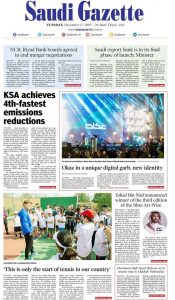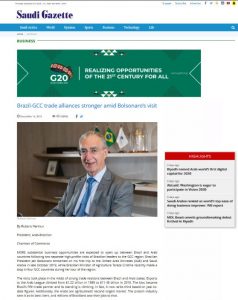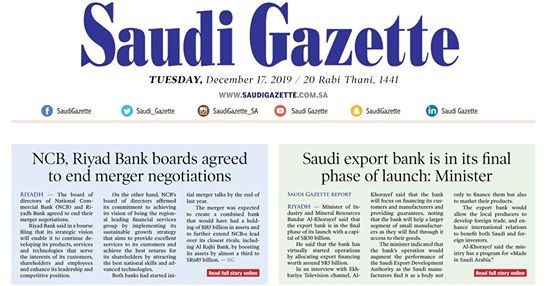São Paulo – The Tuesday (17) edition of Jeddah, Saudi Arabia’s Saudi Gazette daily featured an article by Arab Brazilian Chamber of Commerce president Rubens Hannun on the enhancement of trade relations between Brazil and the Gulf Cooperation Council (GCC) in the wake of tours of the the region by president Jair Bolsonaro, in October, and Agriculture minister Tereza Cristina, in September. Established 1978, Saudi Gazette is one of the major English-language dailies in Saudi Arabia.

“In the Arab culture, relationship is a precondition for closing deals,” Hannun states in the article. “Handshakes of heads of states are more effective than one can imagine.” He explains that in many Arab countries, importers are licensed by the state, and governments themselves will import and invest abroad via sovereign funds, hence the importance of good relations between Brazilian and GCC authorities.
He notes that the Saudi Public Investment Fund (PIC) has revealed plans to invest USD 10 billion in strategic industries in Brazil, including food security and infrastructure. “Early next year, a corporate delegation led by Saudi Minister of Commerce and Investment Majid bin Abdullah Al Qasabi will identify key areas of cooperation,” Hannun reveals.
News was also disclosed during Bolsonaro’s tour that Brazilian food company BRF, the parent company for brands Sadia and Perdigão, will have its own plant in Saudi Arabia – a USD 120 million project.
“Almost every Arab country is interested in creating projects in the food industry. The Arab sovereign funds have USD 2.3 trillion to invest, while Brazil has much to offer in logistics and food security,” wrote Hannun. “The Arab culture sees investment as sharing the results of productive activities.”
Read on for the full article, or click here to proceed to the Saudi Gazette website
Brazil-GCC trade alliances stronger amid Bolsonaro’s visit
Rubens Hannun
President, Arab Brazilian Chamber of Commerce
More substantial business opportunities are expected to open up between Brazil and Arab countries following two separate high-profile visits of Brazilian leaders to the GCC region. Brazilian President Jair Bolsonaro embarked on his first trip to the United Arab Emirates (UAE) and Saudi Arabia in late October 2019, while Brazilian Minister of Agriculture Tereza Cristina recently made a stop in four GCC countries during her tour of the region.

The visits took place in the midst of strong trade relations between Brazil and Arab states. Exports to the Arab League climbed from $1.22 billion in 1989 to $11.48 billion in 2018. The bloc became Brazil’s fifth trade partner and its standing is climbing. In fact, it now ranks third based on year-to-date figures. Additionally, the Arabs are agribusiness’ second largest market. The protein industry sees it as its best client, and millions of Brazilians owe their jobs to that.
In the Arab culture, relationship is a precondition for closing deals. Before signing any contract, trust must be built. Agreements are rarely signed at the first trip, and occasionally it is even necessary that the parties’ families meet each other.
Handshakes of heads of states are more effective than one can imagine. In many Arab countries, importers are licensed by the state, and governments bring about imports or invest through sovereign funds in and out their territories.
President Bolsonaro’s visit was not only a chance to boost trade and further the already strong ties between parties, which can be largely expanded and diversified, but also to discuss strategic operations to take the relations across all fronts to new levels of growth and development.
From Saudi Arabia, for example, came a great news that the country will invest $10 billion in strategic sectors such as food security and infrastructure in Brazil. Early next year, a corporate delegation led by Saudi Minister of Commerce and Investment Majid bin Abdullah Al Qasabi will identify key areas of cooperation.
On the other hand, the Saudis celebrated the announcement of major Brazilian food company BRF that it will invest $120 million to build its first chicken processing plant in Saudi Arabia in a bid to strengthen its position in a key growth market.
Further, in September, the Saudi government opened up the possibility for Brazil to export dairy and honey to the country. It also discussed with Minister Cristina how the Kingdom could supply Brazil with fodder. Last year, it already authorized imports of genetic materials and vaccines.
In the case of the UAE, whose GDP is not massively dependent on oil anymore and which excels in re-exporting products, the Emirates has expressed interest in developing partnerships with Brazil. The UAE has sought to ship finished products to Brazil to help generate jobs in exchange for an easier access to over 2 billion consumers.
Almost every Arab country is interested in creating projects in the food industry. The Arab sovereign funds have $2.3 trillion to invest, while Brazil has much to offer in logistics and food security.
Brazil is working towards having access to resources to fix structural gaps, further developing its industrial production, and reinforcing its ties with strategic allies. The Arab culture sees investment as sharing the results of productive activities. In view of this, Brazil should maximize all opportunities to fulfill shared objectives and achieve the desired results.
Translated by Gabriel Pomerancblum & Guilherme Miranda




